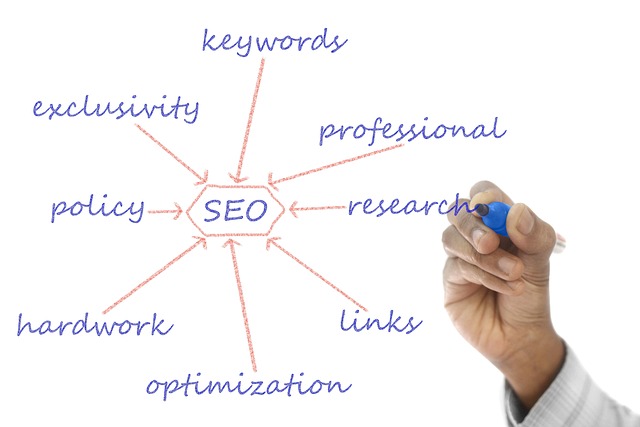In today's digital era, a strong online presence is crucial for business success, especially for universities aiming to attract students. Professional SEO (Search Engine Optimization) programs offer a competitive edge through strategic optimization that boosts website visibility and organic traffic. A vital step is conducting an SEO audit, which evaluates technical, on-page, and off-page elements to identify areas for improvement. Universities should select tailored SEO programs focusing on education-specific keywords, mobile optimization, and backlink strategies. Post-audit, implementation prioritizes issues based on impact, fostering a visible digital presence. Tracking success using set metrics and KPIs within professional SEO programs ensures data-driven improvements and meets online marketing goals.
In today’s digital era, Search Engine Optimization (SEO) is vital for modern businesses aiming to thrive. Understanding and mastering SEO can drive online visibility, attract potential customers, and ultimately boost sales. This comprehensive guide, “SEO Audit University,” delves into the intricacies of SEO, equipping you with essential knowledge. We explore what a SEO audit entails, its significance, key components, and how to choose the right Professional SEO Programs. Learn effective strategies for implementing changes based on audit findings and tracking post-audit performance.
Understanding the Importance of SEO for Modern Businesses

In today’s digital era, having a strong online presence is crucial for any business aiming to thrive and reach its target audience. This is where Professional SEO Programs step in as game-changers. Search Engine Optimization (SEO) is not just a buzzword; it’s an essential strategy that empowers businesses to enhance their visibility and attract potential customers organically. By understanding and implementing effective SEO practices, modern companies can navigate the complex digital landscape and stay ahead of the competition.
SEO plays a vital role in connecting businesses with their ideal clients. It involves optimizing websites and content to rank higher on search engine results pages (SERPs), making it easier for users to discover relevant brands. With the vast amount of information available online, effective SEO strategies ensure that businesses stand out from the noise, fostering growth and long-term success.
What is a SEO Audit and Why is it Crucial?

A SEO audit, as part of professional SEO programs, is a comprehensive review process that evaluates the effectiveness and performance of a website’s search engine optimization (SEO) strategies. It involves meticulously analyzing various technical, on-page, and off-page factors to identify areas of improvement and ensure the site aligns with current best practices and search engine guidelines. This in-depth assessment goes beyond basic keyword research and includes checking site structure, content quality, metadata optimization, link profiles, mobile-friendliness, and page speed, among other critical aspects.
Conducting regular SEO audits is crucial for several reasons. First, it helps maintain and improve a website’s search engine rankings, ensuring visibility in a competitive online landscape. Second, it identifies technical issues that may hinder the site’s performance, such as broken links or crawl errors, which can negatively impact user experience and search engine indexing. Additionally, SEO audits provide valuable insights into competitor strategies, allowing marketing teams to stay ahead of trends and make data-driven decisions to enhance their online presence and attract more organic traffic.
Key Components of a Comprehensive SEO Audit

A comprehensive SEO audit is an essential process for any university looking to enhance its online visibility and attract a wider student demographic through search engines like Google. It involves a meticulous examination of various factors that contribute to a website’s search engine rankings, ensuring it aligns with best practices in the ever-evolving digital landscape. The key components of such an audit include keyword research, where professional SEO programs help identify relevant academic terms and phrases prospective students might use when searching for university courses or programs.
Additionally, technical analysis is crucial, focusing on factors like website speed, mobile-friendliness, schema markup implementation, and the overall site structure. These elements play a significant role in how search engines crawl and index pages, impacting ranking potential. A thorough SEO audit also delves into content performance, evaluating the quality, relevance, and optimization of web pages to ensure they align with student search intent.
Choosing the Right Professional SEO Programs for Your University

Choosing the right professional SEO programs is a critical step for any university looking to enhance its online visibility and attract more students. With numerous options available, universities must assess their specific needs and goals before selecting a program. It’s essential to consider factors like the program’s depth of coverage, whether it offers mobile-first indexing, and its ability to provide real-time analytics.
Universities should opt for professional SEO programs that are tailored to education sectors, understanding the unique challenges and requirements of marketing an institution. A comprehensive program should include tools for keyword research specific to educational content, on-page optimization techniques, and strategies for building high-quality backlinks from reputable educational websites.
Implementing Changes Based on Audit Findings

After conducting a thorough SEO audit, the next crucial step is implementing changes based on the findings. This involves a strategic approach where each identified area for improvement is addressed with targeted optimizations. Professional SEO programs emphasize the importance of data-driven decisions, ensuring that every modification aligns with the university’s unique digital landscape and goals.
The process begins with prioritizing issues, considering their impact on search rankings and user experience. By utilizing insights from the audit, stakeholders can make informed choices, whether it’s optimizing meta tags, enhancing site speed, or restructuring content for better accessibility. This proactive approach enables the university to stay ahead of the curve in a competitive online environment, ensuring its digital presence is not only visible but also engaging and effective.
Measuring Success: Tracking SEO Performance Post-Audit

After conducting a comprehensive SEO audit, tracking success and performance becomes crucial for any university or educational institution aiming to enhance their online visibility. This involves setting up robust metrics and KPIs (Key Performance Indicators) that align with the goals identified during the audit process. Professional SEO programs offer a structured approach to measuring progress, allowing institutions to gauge the effectiveness of implemented strategies. By regularly monitoring search engine rankings, organic traffic growth, click-through rates, and conversion rates, universities can gain valuable insights into what’s working and where improvements are needed.
For instance, if an audit reveals low rankings for specific keywords relevant to student recruitment, tracking tools can be utilized to measure the impact of optimizing content and building backlinks over time. This data-driven approach enables professionals to refine strategies, ensuring that SEO efforts remain focused and successful in achieving the university’s online marketing objectives.
